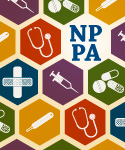November 25th, 2016
A Word of Precaution
Harrison Reed, PA-C
When I try to explain the art of medicine to people –family, friends, strangers on airplanes—I scare them a little. You see, I sometimes say, in medicine there is often not a right or wrong answer. Two clinicians, both competent, might approach the same problem in two very different ways. We don’t refer to one great cookbook of medicine for every problem; our actions are a combination of knowledge, training, experience, preference, and environmental influences.
I understand why that concept might frighten laypeople. They imagine medicine as a magic curtain behind which centuries of flawless science coalesce to a complete consensus. To think that two renowned hospitals or two decorated surgeons might take opposite approaches to the same ailment sounds a lot like tossing a coin.
 But variation in practice is unavoidable. Our collective pool of medical and scientific knowledge expands and morphs at breakneck speed and the implementation of that knowledge often lags behind. We try to balance the early adoption of sound evidence with the threat of overreacting to every signal that emerges from the cloud of theory and research. And each of these decisions are complicated by a long list of biases.
But variation in practice is unavoidable. Our collective pool of medical and scientific knowledge expands and morphs at breakneck speed and the implementation of that knowledge often lags behind. We try to balance the early adoption of sound evidence with the threat of overreacting to every signal that emerges from the cloud of theory and research. And each of these decisions are complicated by a long list of biases.
In medicine, we have another tendency that is often left off the list of sneaky cognitive effects: a bias toward action. It makes sense to have this. After all, patients come to us with a problem on which they expect us to act. We have a massive and growing tool belt and a general agreement that it’s better to fail in heroic attempts than in passive observation. Want a simple test of this theory? Next time someone asks you for your patient care plan say “nothing” and watch the scoffs and eye-rolls begin.
Of course, experienced clinicians know that doing nothing is sometimes a fantastic choice. We don’t work on motorcycle engines. The human body comes with its own plan. We are just the co-pilots.
So how do we balance these concepts: the ever-evolving scientific data pool, our propensity toward action, and the knowledge that sometimes the best course is no action at all? The answer may rest within the precautionary principle.![]()
The precautionary principle states that if an action has the potential to cause harm, in the absence of scientific consensus, the burden of proof that it is not harmful falls on those taking the action. In other words: before we do something, it is our responsibility to prove that it is safe.
It seems like a pretty basic concept and you might think we already incorporate this into our practice of medicine. Often, we do. Drugs undergo a lengthy approval process, new procedures are piloted before they become the standard of care, and randomized controlled trials are the mainstay of evidence-based practice.
But the history of medicine and public health is also riddled with instances of throwing precaution to the wind. The dangers of radiation exposure, for example, had plenty of early whistleblowers, including famous ones like Thomas Edison, and we still took many decades to appreciate the fallout. Asbestos was flagged as an “evil,” harmful material by British factory inspectors in 1898 but it was stuffed into our schools and homes almost 100 years later. And where was the precautionary principle when thalidomide sat on pharmacy shelves despite crippling thousands of infants? Or when the fatal effects of the synthetic estrogen DES, prescribed despite a lack of good evidence of its efficacy, finally came to light? Or when Vioxx hit the market?
It may seem like this is a principle only relevant to environmental safety advocates and federal regulators. But every day we have a chance to apply to the precautionary principle. Perhaps you had an (asymptomatic, non-hemorrhagic) anemic patient whose hemoglobin nudged just below 7.0. Did you order a unit of blood, a treatment with plausible and documented harms, despite any real proof that 7.0 is safer than 6.8?
We could have all used more of the precautionary principle before the recent explosion of opioid prescribing led to epidemic levels of heroin and narcotic drug abuse. If every legislator, drug manufacturer, and prescriber had accepted that burden of proving safety before taking action, thousands of lives might have been saved.
Of course, the very nature of precaution means that at some point we can’t just look back on mistakes of the past. We must consider what we are doing right now. And what we are about to do. We must remember that a bias toward action comes with an obligation to ensure we take the safest course.
And that sometimes restraint is the most heroic action of all.



Aren’t almost all the “precautionary” adverse scenarios mentioned related simply to corporate greed. Shouldn’t it be the Pecuniary Interest principle (“Follow the money”)?
Max,
I think many follies in medicine and public health have an element of prioritizing things (i.e. money) over patient and public safety. However, in many of these instances it is only one contributor to the problem.
Throwing up our hands and distilling all of the problems in our industry to an ambiguous and uncontrollable element like Big Greed is counter-productive. Were some people over-radiating patients with X-rays because they reaped some kind of profit from this? Sure, but lack of education and investigation is/was a far greater contributor to this problem.
In the same way, many have laid much of the blame for the opioid crisis on pharmaceutical companies. And while they no doubt hold a portion of the responsibility, that mindset ignores the fact that every prescription bore the signature of a licensed medical professional.
I find it far healthier to admit that, while some things are out of our hands, in many situations there are elements we can and should control.
-Harrison
Whilst I completely agree that considered wisdom is a great thing in medicine – as many other areas of life, I am worried about three examples –
1. Doctors promoted smoking cigarettes DECADES after the scientific evidence was in. Why? What happened to the “precautionary principle?
2. What has been the medical systems response to pollution, and nuclear war (hey, throw the whole lot in) – “not much” would be a good answer.
3. What has been the medical systems response to the over whelming tide of evidence that suggest that our food system is currently like smoking was 50 years ago – controlled to our adversity by limited (financial) interests.
I am passionately engaged in all these ideas – and would not suggest for a minute that you or I are throwing up our hands, but why are so many reasonable intelligent well off people (i.e. doctors) behaving – literally- the opposite of your suggestion?
Watch , stop,waite look,observe,monitor,think,research,investigate,externalise the problem by talking to others,ask advice,seek help.allthese are active processes and describe my emergency management in anaesthetics .it’s also a list I could apply in all medicine before doing anything to a patient
This is a good considered view that needs more advocates among physicians. The comments are very valid too. The pecuniary interest has affected medical decision-making for far too long. Medical judgement has been thus clouded on too amy ocasions that often leads to fatal outcomes.
But what is the way out of this? How on earth are we to curb the natural instinct of self-interest? The need for pecuniary gain? The capitalist system has been so succesful as a political system the world over because it caters to that instinct. Medical men/women are mere pawns in this game….
But try we must …… Man’s striving for perfection to be one with the universe is an invigorating driving force of life itself.
So deliberately leaving tens of thousands of legitimate, responsible chronic pain patients to suffer in unbearable agony is preferable to the possibility of “making” one more addict? How about instead of torturing the truly innocent, we impose a little personal responsibility on the addicts choice to abuse a drug they had no legitimate need for and leave Doctors to treat actual, legitimate patients with compassion and the drugs they need to control their pain? That sounds more common sense to me.